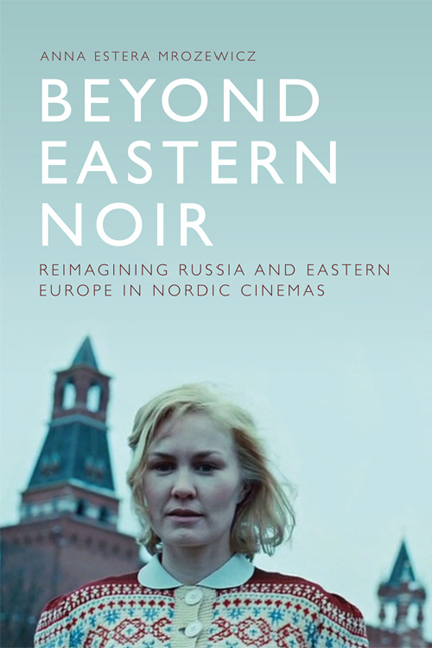Book contents
- Frontmatter
- Contents
- List of Figures
- Acknowledgements
- Introduction – The Iron Curtain Effect: Nordic Eastern Noir
- 1 Borders: Russia and Eastern Europe as a Crime Scene
- 2 Boundaries: Infiltrated Identities
- 3 The Baltic Boundary
- 4 Guilt and Shame in (Trans)national Spaces
- 5 Embodying the Fear of Russia: The Militarised Body
- 6 Polish Spectres in our House: Revisiting the Nordic Metaphor of the Home
- Afterword – Beyond Eastern Noir: Toward a New (Cinematic) Space
- Bibliography
- Filmography
- Index
2 - Boundaries: Infiltrated Identities
Published online by Cambridge University Press: 24 April 2021
- Frontmatter
- Contents
- List of Figures
- Acknowledgements
- Introduction – The Iron Curtain Effect: Nordic Eastern Noir
- 1 Borders: Russia and Eastern Europe as a Crime Scene
- 2 Boundaries: Infiltrated Identities
- 3 The Baltic Boundary
- 4 Guilt and Shame in (Trans)national Spaces
- 5 Embodying the Fear of Russia: The Militarised Body
- 6 Polish Spectres in our House: Revisiting the Nordic Metaphor of the Home
- Afterword – Beyond Eastern Noir: Toward a New (Cinematic) Space
- Bibliography
- Filmography
- Index
Summary
The films examined in Chapter 1 placed Nordic and Russian/Eastern European encounters in an international rather than a transnational frame. Clear-cut and homogeneous nationalities are inherent in the border discourse. This distinction between international and transnational follows from the definition of internationalisation provided by political scientist Peter Katzenstein, who differentiates between internationalisation and globalisation – the two processes that dominated public discourse after the end of the Cold War. Whereas internationalisation is ‘a process that refers to territorially based exchanges across borders’, which ‘permit continued differences in national practices’, global processes are defined by Katzenstein as transcending space and compressing time, producing a move toward a ‘convergence of national differences and also toward a wide variety of local processes of specific adaptation to global changes’ (2005: 13). In transnationality, which I understand here in the vein of Katzenstein's definition of globalisation and as different from internationality, the border itself becomes negotiated and blurred; rather than a communication or exchange between two different destinations/nations/cultures, the transnational forges the inseparability of the actors, who also become transformed by the very process in question. This inseparability is emphasised by the metaphor of transnationality as a single coin with two sides (Weissmann in Agger 2016a: 86). Even when the plots analysed earlier in Chapter 1 led to exchanges across borders – rather than conflict and division – the distinct national identities of the characters (Norwegian/Russian, Swedish/Latvian) remained unaffected by these interactions.
I shift my focus in the present chapter to figures that embody transnational entanglements par excellence: spies and double agents. Espionage activities are, by definition, about crossing borders in ways that should remain unnoticed by the infiltrated group. Yet, the films explored in this chapter are not typical ‘James Bond’ spy narratives – represented in Nordic cinemas by numerous adaptations of the Swedish writer Jan Guillou's novels about Commander Hamilton, alias Coq Rouge – but rather, they assume complex perspectives on the spy's entanglement with the ‘other’ (or ‘enemy’) side. Neither do these films adhere to the Cold War spy master narrative casting the foreign spy as the unquestioned antagonist of ‘our’ protagonist. Rather, the spies here embody discourses of the boundary: their ability to perform the ‘other’ identity and cross borders seamlessly questions and even threatens narratives of national purity and cohesion, undermining what I have defined earlier as the border discourse.
- Type
- Chapter
- Information
- Beyond Eastern NoirReimagining Russia and Eastern Europe in Nordic Cinemas, pp. 62 - 92Publisher: Edinburgh University PressPrint publication year: 2018



